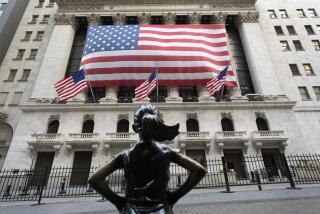Optimistic Forecasts Prevail at Business Council Meeting
- Share via
HOT SPRINGS, Va. — Chief executives of some of the nation’s largest corporations painted a surprisingly optimistic picture of the nation’s economic prospects Friday.
Despite more than two years of sub-par economic growth and their own official forecast that the economy would be only “muddling through, with growth neither robust nor weak,” many of the executives attending the semiannual meeting of the Business Council cited recent improvements in their own firms as evidence that the economy appears to be on the mend.
For example, Edmund T. Pratt Jr., chairman of New York-based Pfizer, a leading pharmaceutical company, pointed to the reopening of a Pfizer plant in Michigan as evidence that the weakening dollar is finally beginning to improve the position of U.S. firms against their foreign competitors.
When the Pfizer plant, which makes iron oxide coatings for magnetic tape, closed in 1982 because of huge losses in the face of the cheap prices of Japanese firms, “I never thought the plant would reopen again,” Pratt said.
But with the 40% depreciation of the U.S. dollar against the Japanese yen in the last year, the reopening is “a dramatic sign that perhaps our trade prospects are improving.” Pratt, however, remains worried that the U.S. economy cannot continue to move ahead as long as the federal budget deficit fails to shrink significantly.
Other executives were also generally pleased with the recent performance of their firms.
Philip M. Hawley, chairman of Los Angeles-based Carter Hawley Hale Stores, the firm that owns, among others, the Broadway and Neiman-Marcus department stores, said consumer demand has picked up in the last 60 days. Hawley said that consumers, reflecting growing confidence, have increased their purchases of “better, higher-quality merchandise” and that the prospects were good for the “all-important fourth quarter.”
And Harry Gray, chairman of United Technologies of Hartford, Conn., said his diversified manufacturing company is having a record year. Its commercial aircraft engine business “is tremendous” and the military aircraft business “is also very good and will be for several years.” Even United Technologies’ sales in the highly competitive auto supply industry are “extremely good” and expected to stay strong through 1987.
Not all the executives, of course, shared in the generally upbeat mood. The depressed oil industry is going through a “very sharp restructuring,” said George M. Keller, chairman of San Francisco-based Chevron Corp., because of the dramatic decline in oil prices this year.
Adding to the oil industry’s woes, Keller said, is the recently approved tax revision bill, which is going to have a “very major negative effect on oil companies,” and the Superfund toxic waste cleanup program, which “dumps pretty hard on the oil industry.”
However, with prospects already so bleak in the oil industry, Keller noted wryly, Chevron does not have to worry much about the tax bill for the next couple of years because “we won’t have any profits to tax.”
The Business Council, composed of more than 100 current and former chief executives, meets twice a year to share opinions and hear from several leading government and business officials.
On Friday, Commerce Secretary Malcolm Baldrige predicted that the nation’s burdensome trade deficit will shrink by $30 billion to $40 billion in 1987. It is expected to hit $170 billion this year. That should help to blunt the demand from Congress for further protectionist measures, he added.
More to Read
Inside the business of entertainment
The Wide Shot brings you news, analysis and insights on everything from streaming wars to production — and what it all means for the future.
You may occasionally receive promotional content from the Los Angeles Times.










